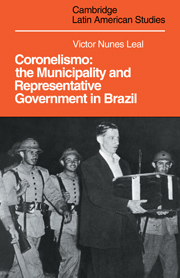Book contents
- Frontmatter
- Contents
- Editor's note
- Introduction by Alberto Venancio Filho
- A note on the term coronelismo
- 1 Notes on the structure and functioning of coronelismo
- 2 Powers of the municipalities
- 3 The elective principle in municipal administration
- 4 Municipal revenue
- 5 Organisation of the police and the judiciary
- 6 Electoral legislation
- 7 Conclusion
- Notes
- Bibliography
Editor's note
Published online by Cambridge University Press: 05 October 2010
- Frontmatter
- Contents
- Editor's note
- Introduction by Alberto Venancio Filho
- A note on the term coronelismo
- 1 Notes on the structure and functioning of coronelismo
- 2 Powers of the municipalities
- 3 The elective principle in municipal administration
- 4 Municipal revenue
- 5 Organisation of the police and the judiciary
- 6 Electoral legislation
- 7 Conclusion
- Notes
- Bibliography
Summary
Since its first appearance in Brazil in 1949, Victor Nunes Leal's Coronetismo, Enxada e Voto, here entitled Coronelismo: The municipality and representative government in Brazil, has come to be recognised as a classic analysis of the system that emerges from ‘the superimposition of structural forms evolved through the representative process on an inadequate social and economic structure’.
The text is here published without any substantial change or addition, according to the author's wish. His insights and approach remain as suggestive as when they first appeared; as Barbosa Lima Sobrinho pointed out in the preface to the second Brazilian edition, the work is not only the analysis of a structure, but the record of that structure and of the arguments about it at a certain time, a record important in itself.
Its place in the development of political analysis in Brazil is set out in Alberto Venancio Filho's introduction: ‘a divide in the history of political science in Brazil … the first landmark of the study of politics in our universities’. The work is everywhere recognised as an essential text for the student of that country.
It is also an essential text for the student of caciquismo in the hispanic and mediterranean world. Dr Nunes Leal's material is the history of Brazil, the laws of Brazil and the Brazil of 1949, but his model investigation provides guidance and stimulus to all those interested in that area where conventional political science and the study of the local community by sociologist or anthropologist so often fail: the nexus between superior government and locality, the boundaries of private and public power and their interdependence, the imperfections and constraints of democracy at its not-very-fertile root, whether in Brazil or elsewhere.
- Type
- Chapter
- Information
- CoronelismoThe Municipality and Representative Government in Brazil, pp. xPublisher: Cambridge University PressPrint publication year: 1977



